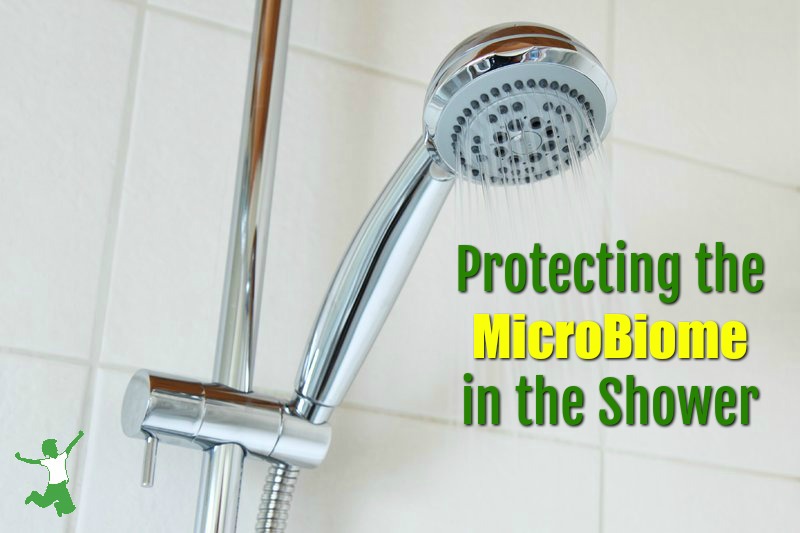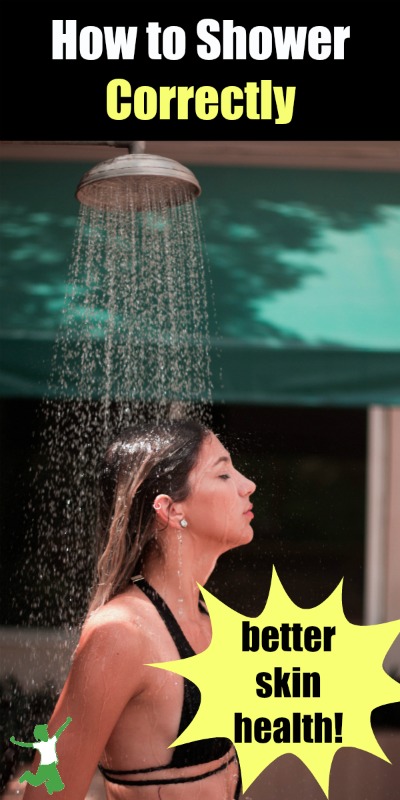Table of Contents[Hide][Show]
How to shower correctly to preserve your skin flora and external microbiome which is protective against outbreaks of atopic dermatitis, dryness, and other chronic issues, perhaps even skin cancer.
When you think of taking a shower, most of us do not think that there is a right way or a wrong way to do it.
I mean, when you were little and took your first shower by yourself, did your parents or caregivers give you instructions on how to do it “right”?
Of course not.
You just turned on the water to a comfortable temperature, stepped in the shower, soaped up and rinsed off.
That was it.
Pretty simple.
Taking a Shower “Wrong” Harms Your Microbiome
As it turns out, there really is a right way to take a shower.
The reason to consider the proper method for showering is because the microbiome of your skin is very fragile.
Water that is too hot and soap can destroy the proper balance of good bacteria on your skin.
When compromised, eczema, dryness, itchiness, and other problems can emerge possibly becoming a chronic nuisance.
The Problem with “Overwashing”
In the Age of COVID, questioning the wisdom of overwashing is a bit strange to be sure!
Washing your hands, for 20 seconds, many times a day is possibly the single most valuable thing you can do to prevent the spread of the coronavirus and other infectious diseases.
While washing your hands is a smart prevention strategy, applying this technique to the rest of the body is not!
Soap very effectively destroys any good flora it comes into contact with, so lathering up your entire body once or more every day is not a smart move.
When the good flora is gone, the skin becomes highly vulnerable to infections, dryness, and atopic dermatitis to take hold.
Yes, you can actually cause eczema simply by bathing or showering wrong!
The Reality of What Lives on Your Skin
The skin is the largest organ of the body, home to trillions of microbes. When properly cared for, the good microbes far outnumber the bad, providing a protective and enhanced immunological effect that is critical to wellness.
It’s not just microbes either.
Tiny, microscopic BUGS actually live on your skin too, and they provide some very beneficial effects…natural exfoliation among them. (1)
Before you freak out and go take a bleach bath to get those critters off of you, note that they are symbiotic in nature. By and large, they are helping you stay healthy rather than actively harming you.
Beneficial Flora Could Prevent Skin Cancer
A recent study conducted by the University of California, San Diego led by dermatologist Richard Gallo found that the exterior microbiome can even be protective against skin cancer. (2)
First, the team covered one group of mice with a bacterium that is present on most human skin called Staphylococcus epidermidis.
The second group got a bath of a different strain of the same bacterium.
Then the mice all got suntans.
Those mice coated with one type of the Staph epidermidis developed fewer skin cancers. The researchers theorized that this particular microbial strain produces a compound called 6‑N‑hydroxyaminopurine, which seems to prevent the replication of tumor cells.
Personal Care Products Matter Too
It’s not just too much soap, scrubbing and hot water that is damaging your skin’s microbiome.
Toxic personal care products with preservatives, chemicals, and other additives can harm these friendly creatures too.
Parabens are no doubt the chemical still widely used in personal care products that have gotten the most negative press over the years.
Companies don’t seem to care much about the research that shows how damaging it is, particularly in toxic deodorants and antiperspirants used so close to delicate breast tissue (parabens have been found in breast tumors).
It is up to you to avoid them!
Parabens One of the Worst Offenders
Researchers at the National Institute of Allergy and Infectious Diseases discovered that products containing parabens can block the growth of Roseomonas mucosa. This is a beneficial bacterium that can kill another pathogenic bacterium, one that proliferates during eczema flare-ups called Staphylococcus aureus. (3)
Geneticist Julie Segre, who published the first topographical maps of human skin’s bacterial and fungal diversity, is at a loss as to why the gut microbiome seems to get all the attention. She has this to say about the importance of skin flora, which she calls the “microbial garden”.
I don’t understand exactly why it is that people have such a different sense of the microbes that live in their gut than they do about the microbes that live on their skin. Everyone wants to eat Activia yogurt and colonize themselves with bacteria, and then they want to use Purell.
How to Shower Correctly
Hopefully, you are now convinced that taking care of your skin’s microbiome is very important to your long-term health.
Beyond the prevention of outbreaks of atopic dermatitis, preservation of skin flora could even have an impact on whether you develop skin cancer based on the early animal studies thus far.
So, how do you shower correctly to preserve skin health?
Limit Soap to Three Areas
First and foremost, limit the use of soap to the “bits”.
What are the “bits”?
Armpits, groin, and feet.
For the most part, these are the only places you should use soap when you shower. This includes your face.
If you don’t have body odor issues due to a healthy diet and balanced gut function, not using soap on the groin area (or just soaping it up occasionally) is a very good idea too according to some doctors.
The exception to this rule would be when you use any sort of chemicals on the skin such as sunscreens which need to be forcibly removed because water alone won’t do the job.
Of course, hopefully, you avoid using chemical-based sunscreens anyway. But, if you still do for whatever reason (please switch to nontoxic brands!), you will need soap and water to get those chemicals off your skin.
Otherwise, just rinse everywhere with the exception of the feet, groin, and underarms.
This includes avoiding soap, cleansers, or exfoliants on your facial skin too.
For example, I never use cleansers on my face unless I wore makeup that day. Since I almost always go makeup-free, most days my face just gets a rinse in the shower or at the sink.
Your facial skin will age much slower if you stop with all the cleansing, toning, etc. You are doing more harm than good and spending a lot of money on expensive products for basically no benefit.
Bonus. When you stop cleansing your face all the time, you can gradually wean off the moisturizers too because your skin won’t be dry most of the time. If your skin is still dry despite avoiding soap, look to your diet. Eating the right kinds of fat is critical to skin health too.
Use Warm, Not Hot Water (that is filtered)
The second strategy to preserve the skin microbiome when showering is to watch out for excessively hot water.
When water is too hot, it will slowly strip away the oils in the outer layers of skin that help preserve moisture and protect skin flora. This can lead to flare-ups from increased susceptibility to irritants and allergens.
It’s important that the shower water is filtered as well. Chlorinated tap water can decimate skin flora just as surely as drinking it can kill them in the gut.
I suggest this green brand of shower filter for removing impurities that can adversely affect the skin microbiome. For a comprehensive solution that will provide clean water to every faucet, consider investing in a whole house water system.
You will be amazed how much healthier your skin looks and feels after just a few weeks of showering sans soap in only clean, filtered water, lathering up just the “bits” that really need it.

How Fast Does Skin Recover?
Sandy Skotnicki, an assistant professor of dermatology at the University of Toronto, has been practicing for 23 years.
When itchy, rash-prone clients come to her office, one of her first questions is, “How do you shower?”.
The typical response is that they wash their whole body with some sort of body wash…sometimes twice a day if they are working out.
Rather than prescribing some sort of steroid cream, she simply tells them to stop using soap everywhere and wash the bits only. (4)
Within a short period of time, they are totally fine!
References
(1) Ubiquity and Diversity of Human-Associated Demodex Mites
(2) A commensal strain of Staphylococcus epidermidis protects against skin neoplasia
(3, 4) Hygiene is Overrated








Sarah, You have beautiful skin. On the days you wear makeup and wash your face, what brand soap do you use?
That is so nice of you to say 🙂 I use a simple honey and goat milk soap bar.
Quality information as always. Short & sweet. Thank you!
So, I assume microdermabrasion is ruining facial skin too. I find it helps my skin absorb healthy moisturizing cream with EO’s.
Yes, microdermabrasion is awful for the skin longterm, sorry to say. Short term, things look great of course, which can mislead into thinking it is a healthy practice. If you have issues with natural exfoliation of the skin, I would recommend looking into a possible mineral deficiency or selenium, zinc or sulfur … and possibly all three. https://www.thehealthyhomeeconomist.com/minerals-your-skin-is-craving/
Thanks for responding Sarah. I’ll look into your suggestions. And, I had just bought a microdermabrasion at home machine a few months ago. 🙁
Oh bummer 🙁